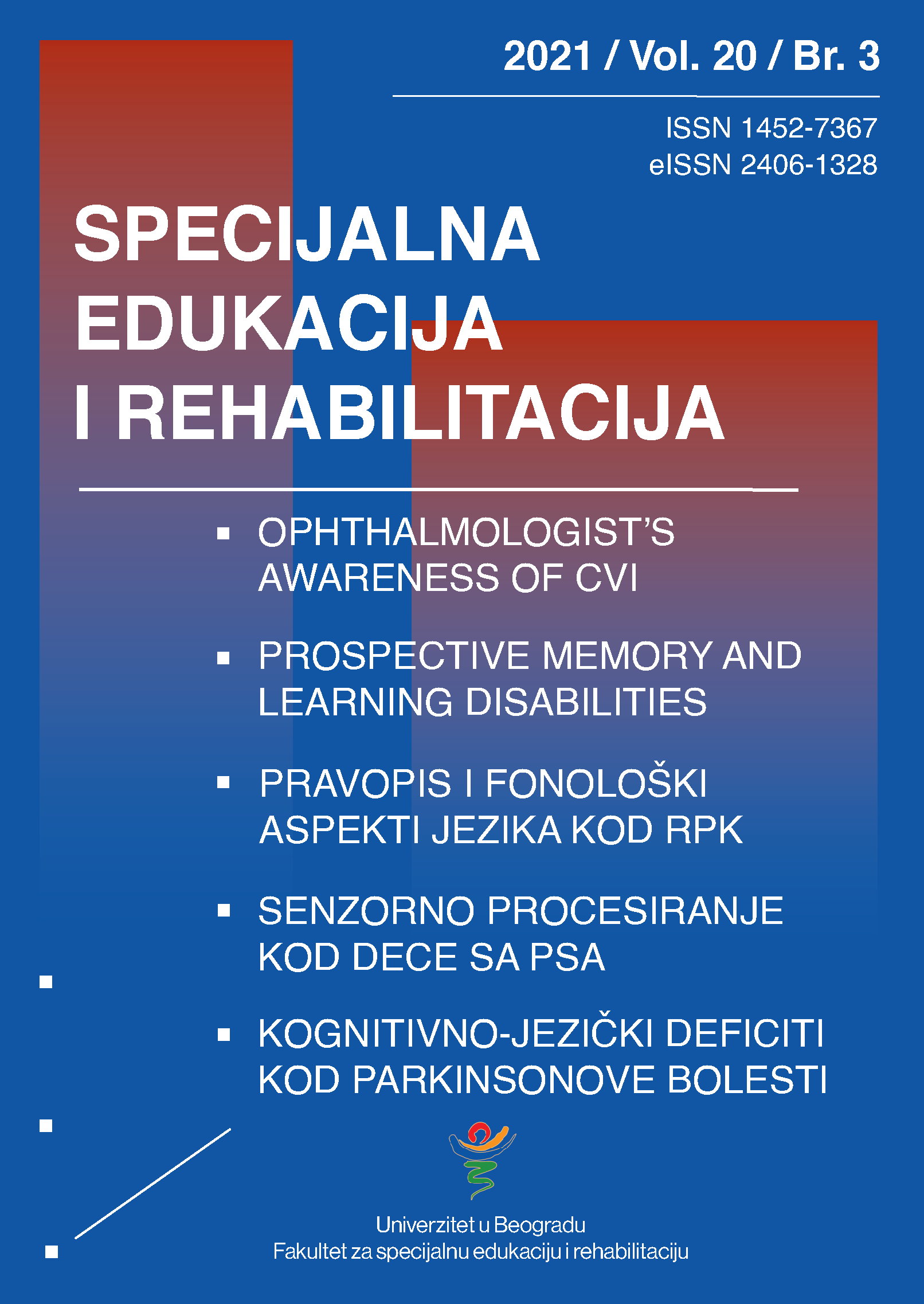Prospective memory in students with learning disabilities
Abstract
Introduction. The importance of memory is not restricted to remembering the knowledge and experiences of the past retrospective memory (RM), but also to remember what an individual must accomplish in the future prospective memory (PM). Objectives. The aim of this study was to identify RM and PM levels in students with learning disabilities (LD) according to some variables (gender, grade) and to identify the differences between the two types of memories. Methods. The study followed the comparative descriptive statistics. The study sample consisted of 37 male and female students with LD in middle school. The Prospective and Retrospective Memory Questionnaire (PRMQ) was used in this study. Results. The results include the following: a statistically significant decrease from the average in PM and RM levels in students with LD, the existence of statistically significant differences between PM and RM in students with LD for the RM, the presence of statistically significant differences in the PM and RM according to the gender variable for females, and the presence of statistically significant differences in PM and RM according to the grade variable for the third grade of middle school. Conclusion. Students with LD may suffer from a decrease in their capacity to remember in the future, which causes many difficulties in daily life. We guide teachers to use external aids for students with LD (such as writing notes) to help students remember performing their tasks.
References
Abdul-Qawi, S. (2017). Neuropsychology foundations and assessment methods. Anglo-Egyptian Bookshop.
Abu Jabal, A .Y., & Al Rabee’, K. F. (2018). The retrospective and prospective memory according gender, age and mental imagery. [Master’s Thesis, Alyarmook University]. Dar AlMandumah. http://search.mandumah.com/Record/988802
American Psychiatric Association (APA). (2013). Diagnostic and Statistical Manual of Mental Disorders, 5th edition (DSM-5). Washington, DC: American Psychiatric Publishing.
Anwar, M. A. (2005). Gender differences in efficiency of childrens episodic memory, in the condition of using motor subjective performed strategy. Egyptian Journal of Psychological Studies, 15(49), 193-246.
Badawi, A. Z. (2016). Cognitive psychology between theory and practice: Prospective memory. Modern Book Hous.
Cejudo, A. B., McDaniel, M. A., & Bajo, M. T. (2019). Event versus activity-based cues and motivation in school-related prospective memory tasks. PloS One, 14(4), Article e0215845. https://doi.org/10.1371/journal.pone.0215845
Crawford, J., Smith, G., Maylor, E., Della Sala, S., & Logie, R. (2003). The Prospective and Retrospective Memory Questionnaire (PRMQ): Normative data and latent structure in a large non-clinical sample. Memory, 11(3), 261-275. https://doi.org/10.1080/09658210244000027
Heffernan, T. M., & Ling, J. (2001). The impact of Eysenck`s extraversion-introversion personality dimension on prospective memory. Scandinavian Journal of Psychology, 4(42), 321-325. https://doi.org/10.1111/1467-9450.00243
IBM Corp. (2016). IBM SPSS Statistics for Windows, Version 24.0. IBM Corp.
Khan, A. (2014). An investigation into prospective memory in children with developmental dyslexia. Frontiers in Psychology, 5, Article 1308. https://doi.org/10.3389/fpsyg.2014.01308
Metwally, F. L., & Al-Qahtani, S. M. (2016). Learning difficulties for innovators and gifted people. Anglo-Egyptian Library.
Mioni, G., McClintock, S. M., & Stablum, F. (2014). Understanding, assessing and treating prospective memory dysfunctions in traumatic brain injury patients. In F. Sadaka (Ed.), Traumatic brain injury (pp. 401-436). BoD – Books on Demand
Riess, M., Janoszczyk, K., Niedźwieńska, A., & Rendell, P. G. (2016). Gender differences in prospective memory in young and older adults. Roczniki Psychologiczne, 19(4), 803-812. http://dx.doi.org/10.18290/rpsych.2016.19.4-5en
Smith, G., Della Sala, S., Logie, R. H., & Maylor, E. A. (2000). Prospective and retrospective memory in normal aging and dementia: A questionnaire study. Memory, 8(5), 311-321. https://doi.org/10.1080/09658210050117735
Smith, R. E., Bayen, U. J., & Martin, C. (2010). The cognitive processes underlying event-based prospective memory in school-age children and young adults: A formal model-based study. Developmental Psychology, 46(1), 230-244. https://doi.org/10.1037/a0017100
Smith-Spark, J. H. (2018). A review of prospective memory impairments in developmental dyslexia: Evidence, explanations, and future directions. The Clinical Neuropsychologist, 32(5), 816-835. https://doi.org/10.1080/13854046.2017.1369571
Smith-Spark, J. H., Zięcik, A. P., & Sterling, C. (2016). Time-based prospective memory in adults with developmental dyslexia. Research in Developmental Disabilities, (49-50), 34-46. https://doi.org/10.1016/j.ridd.2015.11.006
Smith-Spark, J. H., Zięcik, A. P., & Sterling, C. (2017). The event-based prospective memory of adults with developmental dyslexia under naturalistic conditions. Asia Pacific Journal of Developmental Differences, 4(1), 17-33. https://doi.org/10.3850/S2345734117000036
Walter, S., & Meier, B. (2014). How important is importance for prospective memory? A review. Frontiers in Psychology, 5, Article 657. https://doi.org/10.3389/fpsyg.2014.00657
Zimmermann, T. D., & Meier, B. (2010). The effect of implementation intentions on prospective memory performance across the lifespan. Applied Cognitive Psychology, 24(5), 645-658. https://doi.org/10.1002/acp.1576
Copyright (c) 2021 Specijalna edukacija i rehabilitacija

This work is licensed under a Creative Commons Attribution-ShareAlike 4.0 International License.

